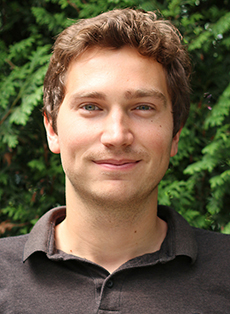Marko Bračić

Department of Behavioural Biology
Institute of Neuro- and Behavioural Biology
Badestr. 13
D-48149 Münster, Germany
Tel.: +49 251/83-24783
bracic@uni-muenster.de
Nationality: Croatian
Optimistic and pessimistic decision-making under ambiguity: causes and consequences for niche choice
Individuals differ in the way they perceive the world. Human psychological research shows that these differences become particularly evident in ambiguous situations, in which individuals lack certain information about the matter under consideration. Symbolic for such situations is the often-quoted question: “Is the glass half-full or half-empty?” While some individuals would say the glass is half-full, others would describe it as half-empty, indicating the existence of optimistic and pessimistic decision-makers (i.e. optimists and pessimists).
This concept was successfully transferred to animal welfare science, revealing that humans are not the only animals to judge optimistically or pessimistically in an ambiguous situation. Furthermore, it has been shown that both the environment (housing conditions) and the genotype can influence such decision-making processes under ambiguity. In natural conditions, outcomes of these decisions are crucially related to survival and fitness of an animal. Based on these considerations, we want to transfer the study of decision-making under ambiguity further to evolutionary ecology for the first time. From an evolutionary perspective, optimistic strategies may provide fitness advantages in other environments than pessimistic strategies. The aim of the thesis is therefore to elucidate, whether differences in decision-making come along with differences in niche choice.
Using laboratory mice as a model organism, the project will be designed as a proof-of-principle study, addressing two main research questions: (1) How does one become an optimist or pessimist? (2) Do optimists prefer other environments than pessimists? Under the first objective, we will investigate effects of genotype, environment, and gene-by-environment interactions on decision-making under ambiguity. Under the second objective, we will study effects of optimism and pessimism on an individual’s preferences for specific environments (niche choice). We hypothesize that optimists choose other environments than pessimists, thereby realising their own individualised niches.
If our hypothesis holds true, there is a great potential to transfer this idea further to other species and systems under more natural conditions and to include direct fitness measures in the study of optimism and pessimism. With fitness measures, we would be able to asses fitness costs of being an optimist or pessimist under different social and ecological circumstances. From a broader perspective, this will contribute to a comprehensive understanding of niche choice concepts that gain increasing importance in the field of evolutionary ecology.
Bračić M, Bohn L, Siewert V, von Kortzfleisch VT, Schielzeth H, Kaiser S, Sachser N, Richter, SH (2022). Once an optimist, always an optimist? Studying cognitive judgment bias in mice. Behavioral Ecology 33(4):775-788. 10.1093/beheco/arac040 [doi]